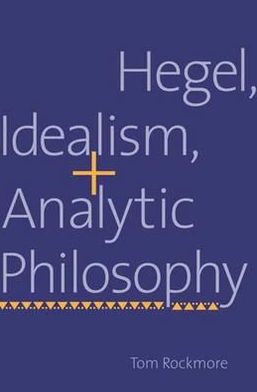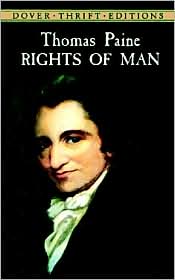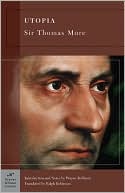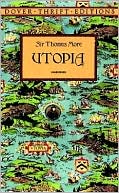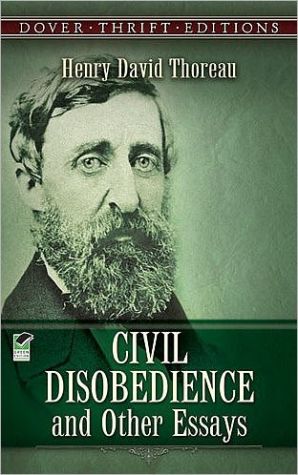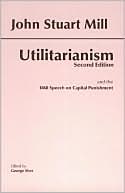Hegel, Idealism, and Analytic Philosophy
In this book—the first large-scale survey of the complex relationship between Hegel’s idealism and Anglo-American analytic philosophy—Tom Rockmore argues that analytic philosophy has consistently misread and misappropriated Hegel.\ According to Rockmore, the first generation of British analytic philosophers to engage Hegel possessed a limited understanding of his philosophy and of idealism. Succeeding generations continued to misinterpret him, and recent analytic thinkers have turned Hegel...
Search in google:
In this book—the first large-scale survey of the complex relationship between Hegel’s idealism and Anglo-American analytic philosophy—Tom Rockmore argues that analytic philosophers have, since the generation of Moore and Russell, consistently misread and misappropriated Hegel. \\
Hegel, Idealism, and Analytic Philosophy\ \ By Tom Rockmore \ Yale University Press\ Copyright © 2005 Yale University\ All right reserved.\ ISBN: 978-0-300-10450-9 \ \ \ Chapter One\ Idealism, British Idealism, and Analytic Philosophy \ What Is Idealism?\ We can start by clarifying some basic terms. Any assessment of the long-standing analytic antipathy to Hegel presupposes an understanding of terms such as "British idealism," "German idealism," and "idealism." Analytic thinkers in revolt against idealism, or British idealism, were often, perhaps never very clear about what they were revolting against. None of the early analytic thinkers had more than a very general, imprecise conception of British idealism, German idealism, or idealism in general. There is no idealism in general any more than there is a general triangle and there is no single doctrinal commitment shared by all thinkers in the idealist camp. Types of idealism are very different. German idealists arguably share common goals, such as developing systematic, scientific philosophy through perfecting Kant's Copernican revolution. Other than opposition to standard British empiricism, British idealism apparently lacks a common philosophical project. The main British idealists defend very different views, which are sometimes opposed to each other as well as incompatible withHegel's. As in Marxism, the frequent, but regrettable analytic tendency to conflate various types of idealism, which on occasion share nothing more than the name, led to the well-known analytic rejection of idealism in virtue of its alleged denial of the existence of the external world. This doctrine, which is widely but uncritically attributed to idealism, is part of neither, nor featured by idealism as such nor the views of any individual idealist.\ The analytic antipathy to Hegel and idealism in general is clear and persistent. Analytic thinkers, members of a philosophical movement that prides itself on the precise use of language, have long been suspicious of nonanalytic thinkers for linguistic reasons. Carnap famously attacked Heidegger's alleged misuse of language in making statements which, since they could not be evaluated empirically, were strictly nonsensical. A. J. Ayer echoed Carnap's complaint, saying that Heidegger's statements contributed to his theories and appeared profound, but could not be evaluated and were therefore meaningless.\ For Carnap, Hegel, like Heidegger, formulates metaphysical pseudostatements, and promulgates false doctrines. Hegel's adherence to the "old" logic leads to a view that is materially false, logically untenable, meaningless, and unwarranted as a basis for metaphysics. Popper, who is more extreme, claims Hegel's view is dangerously misleading, absurd, and dogmatic, and represents an absurd theory.\ Since Hegel is at least nominally a German idealist, we can start our discussion of terms with "idealism" and "German idealism." It is not easy to say what "idealism" means. Discussions of this term are frequently terse, uninformative, in any case insufficient to identify a view or doctrinal commitment common to all or even most so-called idealists. Such accounts often consist of general comments followed by a selective list of representative forms of idealism, and ending with a few well-chosen words about an important individual idealist.\ Analytic critiques of idealism vary greatly. Frege's critique of Husserl's alleged psychologism at the end of the nineteenth century, to which we will return below, was directed against a single idealist. The later English analytic turn away from Hegel and all idealists early in the twentieth century was based on a critique of 12/Idealism, British Idealism, and Analytic Philosophy any and all forms of idealism. The latter was fueled by the conviction that a generalization of Kant's critique of "bad" idealism for denying the existence of the external world could fairly be applied to idealism in all its many forms. This general critique implies unspecified doctrinal unity among idealists. Yet the suggested unity among different forms of idealism around a single conceptual theme cannot be found in the texts and simply does not exist outside the caricatural depiction of idealism by its adversaries. For no idealist, not even Berkeley, denies the existence of the external world.\ In practice, "idealism" has diverse, unrelated, or almost unrelated, meanings, meanings which are incompatible, even sharply opposed. Not only is there no idealism in general, but it is not even clear that there is a family resemblance among the many different idealist views.\ Etymologically, the term "idealism" is related to the Greek word "idea," which possesses such meanings as form, appearance (as opposed to reality), species, kind, and nature. The word is used to refer to ideas, concepts, essences, definitions, and objects of the intellect linked to Platonic idealism. It also denotes contents of mind understood as representations of an independent external world-a view common to the so-called way of ideas encompassing both Cartesian rationalism and British empiricism. It further refers to the propensity to be guided by ideals, for instance in a social, political, or religious context, and to the philosophical doctrine of idealism. There is apparently no natural way of using "idealism," which is used normatively or stipulatively, mainly with respect to claims to know. Those who consider themselves, or who are classed as, idealists rarely clarify their understanding of this term. Their opponents typically employ it very loosely to designate anything (and everything) they reject. Who is an idealist obviously depends on what one thinks idealism is. In caricatural form, Kant's rejection of "bad" idealism remains very influential among analytic thinkers, who consistently reject idealism as such. But Kant's view of Descartes as an idealist is not more widely shared than, say, Hegel's conception of Aristotle as a false idealist.\ The term "idealist" seems to have been invented by G. W. Leibniz. In responding to Pierre Bayle, he objects to "those who, like Epicurus and Hobbes, believe that the soul is material," adding that in his own philosophical position, "whatever of good there is in the hypotheses of Epicurus and Plato, of the great materialists and the great idealists, is combined...." Leibniz's usage of the term suggests that idealism and materialism differ, but can be combined. This suggestion was later followed by J. G. Fichte. The contrary view that they cannot be combined was later adopted in Marxism. Neither approach is canonical nor even generally accepted. According to Dewey, idealism concerns ideals. Beginning with Moore, many analytic thinkers routinely hold that idealism insists on an unacceptable denial of the existence of the external world. According to William James, a pragmatist, the basis of modern idealism lies in Kant's doctrine of the transcendental conception of the subject.\ "Idealism" is used to refer to an implausibly broad variety of disparate positions associated with numerous important figures. They include Plato, Descartes, Leibniz, the Cambridge Platonists (such as Ralph Cudworth, John Smith, Benjamin Whichcote, Nathaniel Culverwell, and Henry More), Berkeley, the German idealists (such as Kant, Fichte, Schelling, and Hegel), British idealists (such as S. T. Coleridge, J. F. Ferrier, T. H. Green, Edward Caird, F. H. Bradley, J. M. E. McTaggart, and Bernard Bosanquet), Italian Hegelians (such as Giovanni Gentile and Benedetto Croce), and Croce's English disciple R. G. Collingwood. Other alleged idealists include Husserl, the central figure in twentieth-century phenomenology, on occasion even Heidegger, and Ludwig Wittgenstein, arguably the central figure in Anglo-American analytic philosophy.\ Idealism was very popular in early nineteenth-century Germany and late nineteenth-century England. It later fell into disrepute, however, as a result of unremitting attack, for different reasons, by analytic and Marxist thinkers throughout most of the twentieth century. Though some philosophers are still mining the idealist conceptual vein, few are currently willing to accept the term as descriptive of their own positions. In twentieth-century America, exceptions include personalists such as B. P. Bowne and P. A. Bertocci; American pragmatists like C. S. Peirce and John Dewey (but emphatically not James, who did much to encourage the reaction against idealism of any kind); Brand Blanshard, a kind of British idealist on American soil; and Nicholas Rescher, whose complex position equally reflects idealist, pragmatist and analytic influences.\ The term "idealism" is used systematically to refer to types of idealism and historically to pick out thinkers with whom it is associated. The many different types of idealism include epistemological and metaphysical variants, then within the latter causal and supervenient-that is, the emergentist view that mental characteristics supervene on physical characteristics-subforms. German idealism employs a distinction, following Hegel's practice, between critical, subjective, objective, and absolute idealist subtypes which are often but uncritically associated with the names of Kant, Fichte, Schelling, and Hegel respectively. Depending on what one means by "German idealism," the term is also associated with Marx. British idealism, which frequently features the absolute in a way different from any form of German idealism, is often known as absolute idealism. Other forms of idealism include social, cosmic, theological, spiritualistic, and conceptual.\ The very proliferation of many different types of idealism, which means such different things to so many different observers, sows a considerable amount of confusion even among its proponents. Even a short list is sufficient to show how very diverse "idealist" views are. Platonic idealism concerns the canonical problem of the one and the many, or the relation of forms, essences, or ideas on the one hand-what things of a given kind have in common-and the multiplicity of things on the other. The term alludes to the notorious theory of forms or ideas that many, but not all, observers detect in Plato's texts, although his own position remains shrouded in mystery. Plato's influence echoes through the later Western philosophical tradition, yet Platonic idealism is basically unlike later forms of idealism. The suggestion that "idealism" means that "ideas or ideals are epistemologically and ontologically prior to things or the real," which describes the position often attributed to Plato, does not clearly apply to any other major idealist.\ Later idealists differ in ways that throw into doubt the use of a single term to apply to them all. Leibniz's idealism is sometimes said to follow from his ontological view that there are only simple substances, which possess perception and appetite. It is also said to follow from his teleological view that this is the best of all possible worlds. Berkeley, who is routinely classed as an idealist, refers to his own view as immaterialism. His famous slogan esse est percipi has apparently nothing other than the name in common with Plato, whose position he is sometimes said to interpret badly. There is no reason to think he was directly interested in the Platonic problem of the one and the many. He reacts against the perceived consequences of the new science and the empiricist philosophy based on it, most prominently in Locke, which appears to exclude God from any role in the world. Berkeleyan idealism is often understood as a "reactionary" effort to counter the effects of modern science to which he opposes a conception that supposedly agrees better with common sense.\ Although the term is the same, the types of idealism which arise in the German idealist tradition are unrelated, in fact sharply opposed, to the usual interpretation of Berkeley's position. Kant and Hegel object to Berkeley's supposed denial of the existence of the external world. Later objections, for instance by Russell, to their views as defending a variant of Berkeley's position are simply mistaken. The central thrust in German idealism lies in a commitment to the so-called Copernican revolution in philosophy, which exemplifies what I will be calling epistemological "constructivism"-roughly, the doctrine that the subject must "construct" what it knows. This doctrine is incompatible with Platonic idealism, with Berkeley's position, and with the views favored by most, perhaps all, analytic thinkers.\ Blanshard's lifelong defense of reason was generally conducted along British idealist lines interspersed with other, incompatible influences. Rescher, who is presently the most important figure to invoke idealism as a designation of his position, rejects causal idealism in favor of conceptual idealism, according to which access to the real is always mind-dependent.\ What Is German Idealism?\ Other than the fact that they wrote in German, it is sometimes difficult to see what German idealists have in common. As noted above, it is usual, although perhaps misleading, to distinguish at least four different subforms of German idealism: Kant's critical idealism, Fichte's subjective idealism, Schelling's objective idealism, and Hegel's absolute idealism. These subforms, which reflect Hegel's view of his great German contemporaries, should be understood with caution. Critics of German idealism tend to apply these same terms in very different ways, as in Dewey's critique of neo-Kantianism as objective idealism.\ One should be careful not to take these terms as referring strictly to any single position. Critics of idealism, such as Marxists who reject so-called subjective idealism, tend to utilize the terms more strictly than Hegel does. He uses the term "subjective" in two distinct ways: to apply only to Fichte's idealism, or again to apply to Kant's and Fichte's positions as distinguished from Schelling's.\ The meaning of all four terms is in any case strikingly unclear. Kant, who depicts all earlier philosophical theories as dogmatic, criticizes forms of prior idealism in depicting himself as a critical philosopher. His idealism has been variously understood as phenomenalistic, psychologistic, transcendental, and so on. Fichte is routinely accused of subjective idealism, or the view that the self, or again the subject, is the origin of all reality. Yet this is a silly position which certainly neither he, nor probably anyone else, has ever defended. In imitation of Kant, Schelling refers to his own position as transcendental idealism. As early as his first philosophical publication, Hegel began the practice of calling Schelling's position objective idealism in virtue of his friend's attention to philosophy of nature (Naturphilosophie). There is no agreement about the meaning of Hegel's so-called absolute idealism, a view routinely attributed to him. He never employs this term to refer to his own position. His understanding of "absolute" and "idealism" remains controversial. At least one observer feels it necessary to justify talking of Hegel's position as idealism at all. Contemporary Hegel scholars say little about the absolute, which seems like a holdover from the beginning of the nineteenth century. But this term was important for British idealism, and central for Bradley.\ There is no agreed-on or even widely accepted description of the relation between Kant, Fichte, Schelling, and Hegel (or Marx) in the literature. Reference works sometimes omit all mention of German idealism. The frequent suggestion that German idealism arose as the result of the felt need to complete Kant's critical philosophy is arguably correct for post-Kantian German idealism. Yet it fails to account for the idealist character of Kant's own position, which depends on his assessment of the proper approach to the epistemological problem.\ (Continues...)\ \ \ \ \ Excerpted from Hegel, Idealism, and Analytic Philosophy by Tom Rockmore Copyright © 2005 by Yale University. Excerpted by permission.\ All rights reserved. No part of this excerpt may be reproduced or reprinted without permission in writing from the publisher.\ Excerpts are provided by Dial-A-Book Inc. solely for the personal use of visitors to this web site. \ \
Ch. 1Idealism, British idealism, and analytic philosophy11Ch. 2Pragmatism, analytic neopragmatism, and Hegel64Ch. 3Hegel, idealism, and knowledge165
